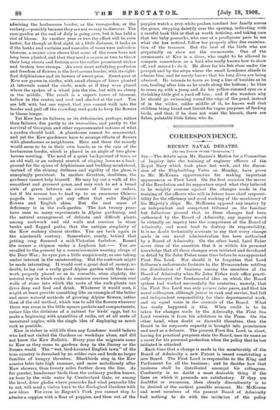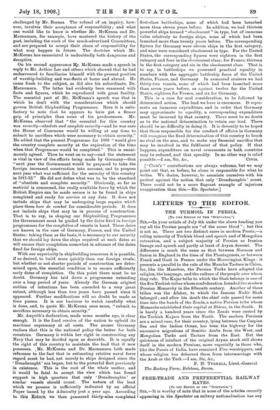CORRESPONDENCE.
RECENT NAVAL DEBATES.
[To ms EDITOR OF THR "EDECTATOR."]
Sin,—The debate upon Mr. Barnes's Motion for a Committee of Inquiry into the training of engineer officers of the Royal Navy which took place last week, and the discus- sion of the Shipbuilding Votes on Monday, have given to Mr. McKenna opportunities for making important appearances as First Lord. On the first occasion the mover of the Resolution and its supporters urged what they believed to be weighty reasons against the changes made in the training of the officers who will in future have chief responsi- bility for the efficiency and good working of the machinery of his Majesty's ships. Mr. McKenna opposed any inquiry by an independent and competent tribunal on the familiar but fallacious ground that, as these changes had been authorised by the Board of Admiralty, auy inquiry would be virtually an inquiry into the competence of the Board of Admiralty, and must tend to destroy its responsibility. It is no doubt technically accurate to say that every change made in our naval administration has been authorised by a Board of Admiralty. On the other hand, Lord Esher never tires of the assertion that it is within his personal knowledge that all these changes were initiated and developed in detail by Sir John Fisher some time before be was appointed First Sea Lord. Nor should it be forgotten that Lord Selborne's unfortunate footnote to the Memorandum settling the distribution of business among the members of the Board of Admiralty when Sir John Fisher took office practi- cally destroyed the fundamental idea on which the Board system bad worked successfully for centuries; namely, that the First Sea Lord was only primus inter pares, and that his naval colleagues, although junior in rank and service, had full and independent responsibility for their departmental work, and an equal voice in the councils of the Board. What has really happened is this. When credit is to be taken for changes made by the Admiralty, the First Sea Lord receives it from his adulators in the Press. On the other hand, when doubt or discredit threatens, then the Board in its corporate capacity is brought into prominence and used as a defence. The present First Sea Lord, in short, having for practical purposes slain the Board, uses its name as a cover for his personal protection when the policy that he has initiated is attacked.
Each time that a change is made in the membership of the Board of Admiralty a new Patent is issued constituting a new Board. The First Lord is responsible to the King and Parliament for all the business ; and he decides how that business shall be distributed amongst his colleagues. Continuity is no doubt a most desirable thing if the lines on which it proceeds are satisfactory. If they are doubtful or erroneous, then clearly discontinuity is to be desired at the earliest possible moment. Mr. McKenna and most members of the present Board of Admiralty had nothing to do with the initiation of the policy challenged by Mr. Barnes. The refusal of an inquiry, how- ever, involves their acceptance of responsibility ; and what one would like to know is whether Mr. McKenna and Dr. Macnamara, for example, have mastered the history of the past, including the work of the much-advertised Committees, and are prepared to accept their share of responsibility for what may happen in future. The doctrine which Mr. McKenna has enunciated is undoubtedly both dangerous and deceptive.
On his second appearance Men McKenna made a speech in reply to Mr. Arthur Lee and others which showed that he had endeavoured to familiarise himself with the present position of warship-building and war-fleets at home and abroad. He came fresh to the subject, as did also his subordinate, Dr. Macnamara. The latter had evidently been crammed with facts and figures, which he reproduced with great facility. The essential part of Mr. McKenna's speech was that in which he dealt -with the considerations which should govern British Shipbuilding Programmes. Here it is satis- factory to note that he appears to have got a firmer grip of principles than some of his predecessors. Mr. McKenna observed that "the essential for this country was security—absolute and complete security—and he was sure the House of Commons would be willing at any time to submit to sacrifices which were necessary to obtain security." He added that the present Programme for 1909 "would give the country complete security at the expiration of the time when that Programme would be completed." This is unani- mously agreed. Then he went on to say—and the statement is vital in view of the efforts being made by Germany—that "next year the Government would be prepared to take the foreign increased construction into account, and to propose next year what was sufficient for the security of this country in 1911-12." He did not define what was to be the standard of "absolute and complete security." Obviously, so far as materiel is concerned, the really available force by which the British Empire can be made secure is to be found in ships completed and ready for service at any date. It does not include ships that may be undergoing large repairs which place them hors de combat for considerable periods. It does not include ships that may be in process of construction. That is to say, in shaping our Shipbuilding Programmes the Government must be guided by the dates fixed in foreign programmes for the completion of vessels in band. These dates are known in the case of Germany, France, and the United States: taking them as the basis, it is necessary to our security that we should lay down the ships required at such dates as will ensure their completion somewhat in advance of the dates fixed for foreign ships.
With our superiority in shipbuilding resources it is possible, if so desired, to build more quickly than our foreign rivals; but whether or not shorter periods of construction are deter- mined upon, the essential condition is to secure sufficiently early dates of completion. On this point there must be no doubt. Germany has laid down a programme extending over a long period of years. Already the German original outline of intentions has been amended to a very great extent, although less than two years have passed since it appeared. Further modifications will no doubt be made as time passes. It is our business to watch carefully what is done, and, to quote Mr. McKenna once more, "submit to sacrifices necessary to obtain security."
Mr. Asquith's declaration, made some months ago, is clear enough. It is the fixed resolve of the nation to uphold its maritime supremacy at all coats. The sooner Germany realises that this is the national policy the better for both countries. Germany is within her right in constructing any Navy that may be decided upon as desirable. It is equally the right of this country to maintain the lead that it now possesses. ,Mr. McKenna and Dr. Macnamara both made reference to the fact that in estimating relative naval force regard must be bad, not merely to ships designed since the Dreadnought' era began, but to the powerful fleet previously in existence. This is the root of the whole matter, and it would be fatal to accept the view which has found support in high quarters that only 'Dreadnoughts' or similar vessels should count. The nature of the lead which we possess is sufficiently indicated by an official Paper issued by the Admiralty just a year ago. According to this Return we then possessed thirty-nine completed
first-class battleships, none of which had been launched more than eleven years before. In addition, we had thirteen powerful ships termed "obsolescent" in type, but of immense value relatively to foreign ships, none of which had been launched more than twenty years before. The corresponding figures for Germany were eleven ships in the first category, and nine were considered obsolescent in type. For the United States, the corresponding figures were eighteen in the first category and four in the obsolescent class; for France, thirteen in the first category and six in the obsolescent class. That is to say, in battleships we possessed practical equality in numbers with the aggregate battleship force of the United States, France, and Germany. In armoured cruisers we bad thirty-two vessels, none of which bad been launched more than seven years before, as against twelve for the United States, eighteen for France, and six for Germany.
This is a case for cool consideration, to be followed by determined action. The lead we have is enormous. It repre- sents an immense expenditure, and in order that Germany may approximate to equality, a corresponding expenditure must be incurred by that country. There must be no doubt as to the national determination to retain our lead. There should be no difficulty in doing it. It is devoutly to be hoped that those responsible for the conduct of affairs in Germany will recognise the fixed determination of this country to brook no rival on the seas, and to make any financial sacrifice that may be involved in the fulfilment of that policy. If that happens, expenditure on naval armaments in both countries may be reduced, and that speedily. In no other way is relief [" Civis's " contributions are always welcome, but we may point out that, as before, he alone is responsible for what he writes. We desire, however, to associate ourselves with his protest against the notion that only 'Dreadnoughts' count. There could not be a more flagrant example of injurious exaggeration than this.—En. Spectator.]







































 Previous page
Previous page